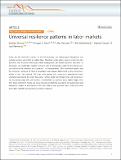Universal resilience patterns in labor markets
Author(s)
Moro, Esteban; Frank, Morgan R; Pentland, Alex; Rutherford, Alex; Cebrian, Manuel; Rahwan, Iyad; ... Show more Show less
DownloadPublished version (4.618Mb)
Publisher with Creative Commons License
Publisher with Creative Commons License
Creative Commons Attribution
Terms of use
Metadata
Show full item recordAbstract
<jats:title>Abstract</jats:title><jats:p>Cities are the innovation centers of the US economy, but technological disruptions can exclude workers and inhibit a middle class. Therefore, urban policy must promote the jobs and skills that increase worker pay, create employment, and foster economic resilience. In this paper, we model labor market resilience with an ecologically-inspired job network constructed from the similarity of occupations’ skill requirements. This framework reveals that the economic resilience of cities is universally and uniquely determined by the connectivity within a city’s job network. US cities with greater job connectivity experienced lower unemployment during the Great Recession. Further, cities that increase their job connectivity see increasing wage bills, and workers of embedded occupations enjoy higher wages than their peers elsewhere. Finally, we show how job connectivity may clarify the augmenting and deleterious impact of automation in US cities. Policies that promote labor connectivity may grow labor markets and promote economic resilience.</jats:p>
Date issued
2021Department
Program in Media Arts and Sciences (Massachusetts Institute of Technology)Journal
Nature Communications
Publisher
Springer Science and Business Media LLC
Citation
Moro, Esteban, Frank, Morgan R, Pentland, Alex, Rutherford, Alex, Cebrian, Manuel et al. 2021. "Universal resilience patterns in labor markets." Nature Communications, 12 (1).
Version: Final published version